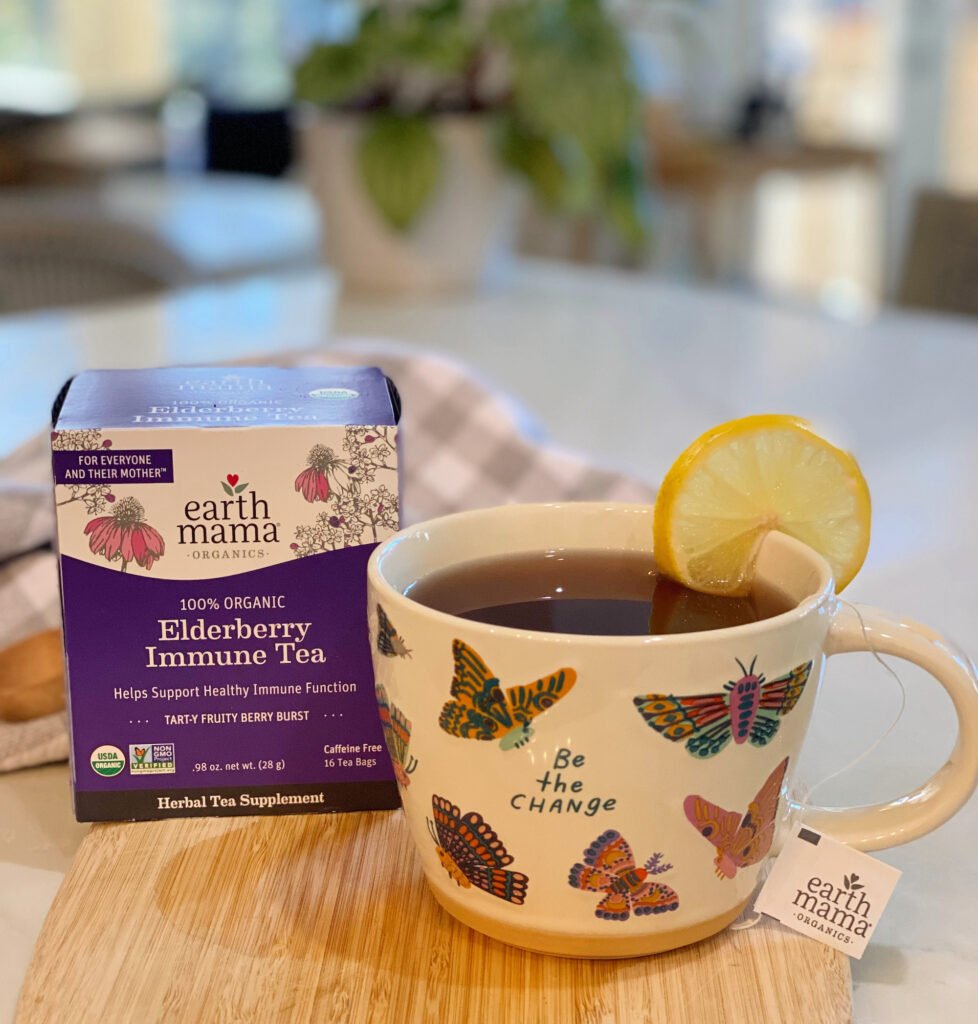The Health Benefits Of Drinking Elderberry Tea
Elderberry has been used for centuries to help with colds, flu, and infections. We’re looking at the many other health benefits of drinking elderberry tea plus the easiest ways to make it.
This traditional remedy has many health benefits. Some studies suggest that elderberry may be effective in reducing the duration and severity of symptoms of colds and flu. In American folk medicine, elderberry was commonly used to treat these conditions and as a diuretic to increase urine production and help with edema.
What is Elderberry?
Sambucus Nigra, also known as black elder, is a species of the elderberry plant that is native to Europe, western Asia, and North Africa. It is a deciduous shrub or small tree that can grow up to 6-12m tall.
The leaves are opposite and have 5-9 leaflets. The flowers are white or cream-colored, and are arranged in large, flat-topped clusters. The fruits are black, blue-black, or dark purple berries that are usually ripe in late summer to early autumn.
Elderberry And The Immune System
Some of the ways elderberry may help boost immune health include:
- Stimulating the production of cytokines: Cytokines are proteins that help regulate the immune response. Elderberry extract has been shown to stimulate the production of cytokines, which can help improve the body’s ability to fight off infections.
- Increasing the production of antibodies: Elderberry extract has been shown to increase the production of antibodies, which are proteins that help the body identify and neutralize harmful pathogens.
- Inhibiting viral replication: Elderberry extract has been shown to inhibit the replication of certain viruses, such as the influenza virus, which can help reduce the severity and duration of cold and flu symptoms.
- Anti-inflammatory properties: Taking elderberry syrup can also help reduce the inflammation caused by viral or bacterial infections.
Elderberries contain vitamin C, an antioxidant that plays a role in maintaining the health of the skin, bones, teeth, and the immune system. They contain around 20-25mg of vitamin C per 100g of fresh berries which is about 30% of the daily recommended value. Dried elderberries contain even more vitamin C per weight unit, as the drying process concentrates the vitamin content.
Elderberries contain a variety of other nutrients and beneficial compounds, including flavonoids, anthocyanins, and antioxidants. These compounds are thought to contribute to the immune-boosting and anti-inflammatory properties of elderberries.
Research from the Journal of International Medical Research suggests that when used within the first 48 hours of symptom onset, elderberry may help relieve and shorten the duration of colds and flu. The government encouraged the use of elderberry during the 1995 Panama flu epidemic.
Elderberry For Allergies
The anti-inflammatory properties may also help reduce symptoms of allergies, specifically respiratory problems. Some of the ways elderberry may help with allergies include:
- Reducing histamine release: Histamine is a chemical that is released by the body in response to an allergen, which can cause symptoms such as sneezing, runny nose, and itchy eyes. Elderberry extract has been shown to inhibit the release of histamine, which can help reduce allergy symptoms.
- Modulating the immune system: Elderberry has been shown to modulate the immune system, which can help reduce the severity and frequency of allergic reactions.
- Inhibiting the production of inflammatory compounds: Elderberry extract inhibits the production of inflammatory compounds such as leukotrienes, prostaglandins and cytokines, which can help reduce the inflammation associated with allergies.
Elderberry and Skin Health
Elderberry is rich in antioxidants, which are beneficial for the skin in various ways. Some of the potential benefits of elderberry for skin include:
- Protecting against sun damage: Antioxidants such as anthocyanins can help protect the skin from the damaging effects of UV radiation.
- Reducing inflammation: Elderberry’s anti-inflammatory properties may help reduce redness, swelling and other signs of inflammation on the skin.
- Improving skin elasticity: The antioxidants in elderberry can help improve the elasticity of the skin, which can help reduce the appearance of fine lines and wrinkles.
- Brightening the skin: Elderberry’s antioxidant and anti-inflammatory properties may help brighten the skin and improve its overall appearance.
Other Health Benefits of Elderberry
Some studies found that elderberry extract may have a hypoglycemic effect, meaning that it may lower blood sugar levels. Elderberry extract can also reduce the absorption of sugar in the gut, and increase the sensitivity of cells to insulin. This may help regulate blood sugar levels, especially important for people with diabetes.
Elderberries are also an excellent source of potassium, an electrolyte that helps to regulate and balance sodium levels in the body. And they contain flavonoids which may help lower blood pressure.
Elderberry Tea
The easiest (and yummiest) way to enjoy the health benefits of elderberry tea is Organic Elderberry Immune Tea from Earth Mama Organics. They’ve packed all the nourishing goodness of elderberry into easy to use herbal tea bags.
Just boil water and steep for 5-10 minutes then treat a sore throat or soothe a cough by enjoying warm. You can also ice it after steeping for cold tea. Either way, your body gets all the immune boosting benefits and you enjoy the tart, fruity taste.
Earth Mama’s organic elderberry tea is
- Safe during pregnancy and breastfeeding
- Safe for kids
- USDA Certified 100% Organic by Oregon Tilth
- Non-GMO Project Verified
- Certified kosher by EarthKosher
- Individually wrapped
- Contains a happy or inspiring note on each tea tag
Take these health benefits even further by using their tea as ingredients in these Elderberry Immune Tea Gummies or Elderberry Immune Tea Popsicles. These immune-boosting treats are perfect for adding to your child’s daily routine or soothing a sore throat or cough.
If you’d love to try their amazing products, get 20% off any regular priced product at Earth Mama Organics using promo code GCLove20.
Whether you’re dealing with eczema or creating a postpartum recovery gift basket, they offer dozens of safe, truly effective products for families.
Homemade Elderberry Tea Recipe
If you prefer the DIY route, here’s how to make your own.
Ingredients:
- 1 cup dried elderberries
- 4 cups water
- 1 cinnamon stick (optional)
- 1 tsp. fresh ginger (optional)
- 1 tsp. whole cloves (optional)
- honey or other sweetener to taste
Instructions:
- Rinse the dried elderberries to remove any debris.
- In a medium saucepan, add the dried elderberries and 4 cups of water.
- Add any optional ingredients (cinnamon stick, fresh ginger, whole cloves, star anise) for additional flavor.
- Place the saucepan on medium-high heat and bring to a boil.
- Reduce heat to low, cover and simmer for 20-30 minutes, stirring occasionally.
- Remove pot from heat and strain the mixture through a fine-mesh strainer into a heat-proof pitcher or mug.
- Sweeten to taste with local or raw honey or any other sweetener of your choice.
- Serve hot and enjoy!
Note: Avoid eating elderberries raw. If you source your own ingredients, it is important to note that not all parts of the elderberry plant are safe for consumption. Make sure you properly identify the plant before foraging for its berries. The berries of the elderberry are usually dark purple or black when ripe and are ready to be picked from late summer to early autumn. The leaves, stems, and unripe berries of the elderberry plant contain a toxic compound called Sambunigrin and should not be consumed.
Elderberry is generally considered safe when consumed in moderate amounts, but some people may experience side effects from consuming elderberry. Some of the most common side effects include:
- Nausea or diarrhea: Some people may experience nausea or vomiting after consuming elderberry, particularly if they consume large amounts of the fruit.
- Allergic reactions: Elderberry can cause allergic reactions in some people, including rashes, hives, and difficulty breathing.
- Interactions with medications: Elderberry may interact with certain medications, particularly blood thinning medications, immunosuppressants, and diabetes medications.


